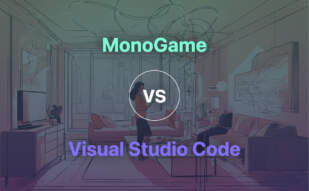
Visual Studio Code
Your quest for a coding superhero ends with Visual Studio Code. Empowering coders with supercharged, wide-ranging functionality, Visual Studio Code stands tall even for demanding web development projects. Whether you code in Australia or Antarctica, this powerhouse breaks boundaries through its robust development environment.
Visual Studio Code’s Top Features
- Extensive remote development: VS Code champions remote work with its innovative Remote Development extension pack, extending your coding capabilities.
- Development prowess: Regardless if you’re a .NET savant or a C++ aficionado, Visual Studio Code has got you covered with specialized functionality for developing in these languages.
- Versatile debugging: Enjoy debugging directly from your code editor – no smoke and mirrors or circumventions necessary.
- Universal compatibility: Whether you use Windows, MacOS or Linux – VS Code is your faithful companion.
- Supports multiple languages: JavaScript, TypeScript, Node.js, C++, C#, Java, Python, PHP, Go, and .NET – you name it and VS Code likely supports it.
| Feature | Description |
|---|---|
| IntelliSense Code Suggestions | VS Code is your coding ally with intelligent refactoring options and code suggestions. |
| Debugger | Monitor application activity, debug running processes, and sponge every bit of information with VS’s proficient debugger. |
| Web Development Tools | AID your ASP.NET application development with VS’s streamlined web designer, supporting HTML, CSS, and JavaScript. |
Visual Studio Code Limitations
- Mac users, take note: Visual Studio for Mac is slated to retire on August 31, 2024. Get your migration strategy ready!
- Complex for beginners: The vast array of features can potentially overwhelm newcomers before they settle in.
Visual Studio Code Pricing
Make the most of your coding prowess without carving out your budget. Visual Studio Code is a tool for the masses; it’s free to use and open source.
Visual Studio Code Use Cases
Use Case 1: .NET Development
If you’re a .NET maestro, Visual Studio Code is the knight in shining armor you’ve been waiting for. With robust .NET development support, it empowers you to craft, debug, and ship stellar .NET projects.
Use Case 2: Remote Coding
Bound by geography? Not with Visual Studio Code. Whether you’re coding in a cafe or on a mountaintop, VS Code’s extensive remote development capabilities allow you to code seamlessly.
Use Case 3: Web Development
ASP.NET, HTML, CSS, JavaScript – all are at your fingertips with Visual Studio Code’s sophisticated web development tools. Better web application development is just a line of code away.
Webflow
Step into the world of Webflow, a platform that redefines eCommerce website creation. Say goodbye to coding and hello to total design control, suitable for a diverse range of physical and digital goods and services.
Webflow Top Features
- Comprehensive product customization options, including fields, cart, and checkout experiences.
- Extensions providing automated shipping, accounting, and notification processes.
- Integrations with native interfaces and numerous Zapier apps.
- All powerful built-in Google Analytics for data-driven insights.
- Ability to import and customize products – t-shirts, prints, classes, stock photos, and more.
| Pros | Details |
|---|---|
| Security | Enjoy peace of mind with secure hosting on SSL domain. |
| Education | Webflow University offers comprehensive video tutorials on building your online store. |
| Marketing | Blog feature and Google inventory sync enhance SEO efforts and drive conversions. |
Webflow Downsides
- Payment processing only via Stripe, PayPal, Apple Pay, and Google Pay.
- Transactional fees apply through Stripe.
Webflow Pricing
For customized control at your fingertips, Webflow pricing starts at $29/mo when billed annually.
Webflow Use Cases
Use case 1: Web Agencies
Webflow offers a platform for creating stunning client websites without the need for programming expertise, hence making it a perfect fit for web agencies.
Use case 2: Content Creators
Content creators can leverage Webflow’s tools to structure content in a meaningful, easily digestible format, enhancing reader engagement.
Use case 3: Designers
Designers can unleash their creativity with Webflow’s robust design capabilities, making complex layouts a breeze to implement.
Joomla
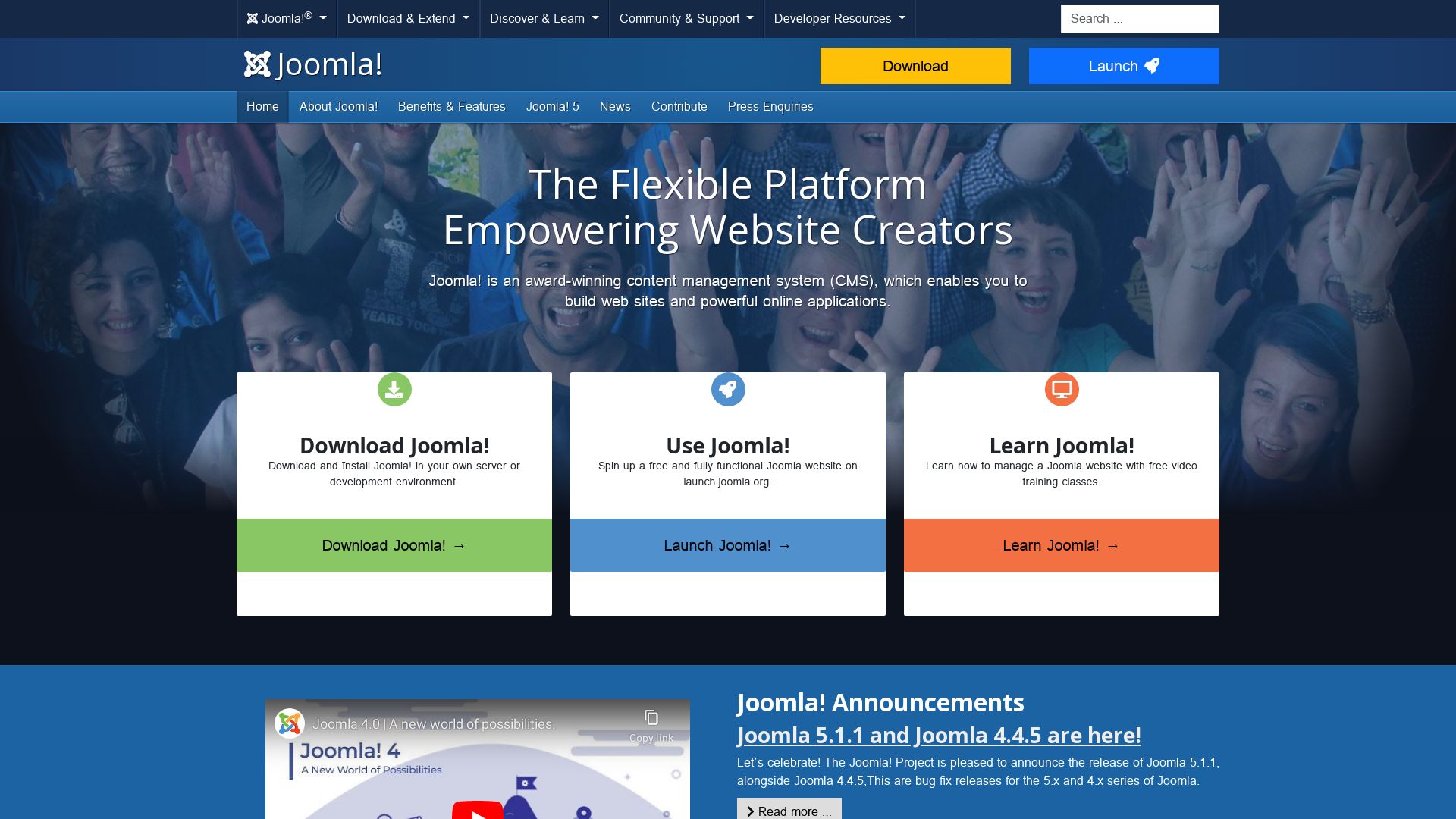
An open-source CMS, Joomla stands tall among platforms for dynamic website building and management. Best suited for businesses seeking an amplified online presence, Joomla has been a go-to for web design professionals since 2009.
Joomla Top Features
- Open-source CMS: Enables building and managing dynamic websites and applications
- Intuitive Interface: Easy to leverage full-feature suite
- Robust for e-commerce: Can be expanded into a powerful e-commerce platform with add-ons such as “Hikashop”
- Up-to-date technology: Latest Joomla version employed offers best-in-class security, performance, and SEO practices
- Extensions: Over 6,000 available for customization
| Latest version | Joomla 4: Offers enhanced website features, increased speed, tighter security, and superior SEO |
| Compliance | Adheres to W3C Accessibility guidelines, ensuring page accessibility |
| Language Support | Supports language internationalization, making it cross-border friendly |
Joomla Limitations
- A steep learning curve for beginners
- Requires frequent updates
- Lacks some premium plug-ins and extensions
Joomla Pricing
Joomla is a free, open-source platform. However, costs may incur for premium plugins, extensions, and hosting plans.
Joomla Use Cases
Business Marketing
With its versatile CMS and abundance of SEO tools, Joomla is a solid choice for businesses aiming to bolster their online presence.
E-commerce
Joomla, extended with Hikashop, makes the creation and management of e-commerce stores smoother. It comes with SEO optimization and shipping options.
Large Scale Web Content Publishing
With its free, open-source nature and extensive language support, Joomla is a scalable solution for businesses and individuals in web content publishing.
Drupal
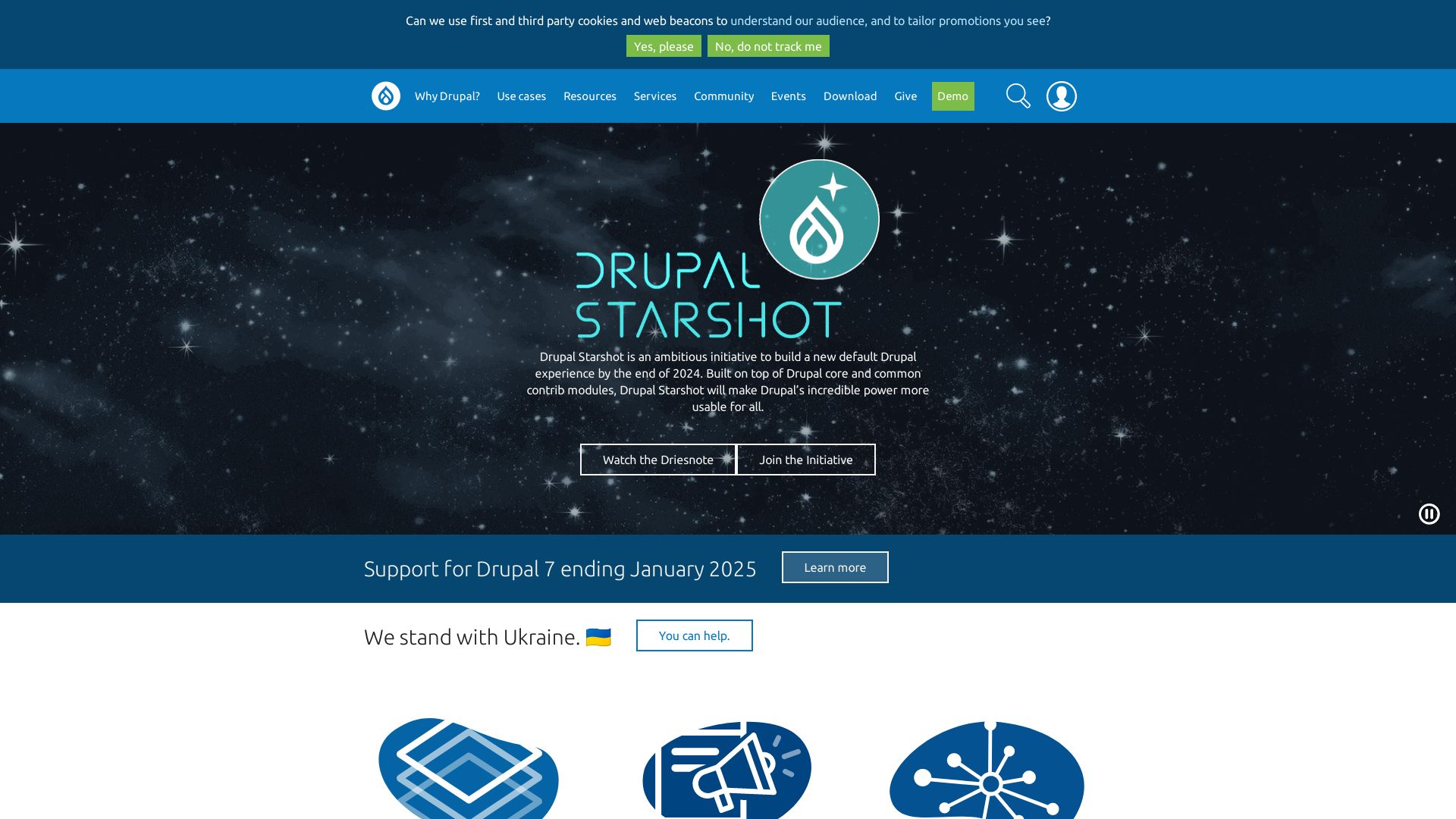
A brainchild of Dries Buytaert and Hans Snijde, Drupal is an open-source eCommerce framework trusted globally. Loved by thousands of developers for its adaptability and robustness, Drupal is here to power your business growth.
Drupal Top Features
- Highly adaptable: Facilitates rapid launch, merchandise creation, and far-reaching improvements in sync with market demands.
- Headless commerce backend: Gives you the freedom to build a commerce backend via JSON:API or custom REST resources.
- International-ready: Takes care of global currency, tax and language needs like a pro.
- Responsive designs: Makes your eCommerce site fit every screen.
- Strong developer community: With over 45,000 developers participating in its development, you get your hands on regular innovations.
| Features | Benefits |
|---|---|
| Design Flexibility | Allows to accommodate design aesthetics requirements with powerful content design strategies across platforms. |
| Advanced Integration | Lets you link your eCommerce site with dynamic platforms like Amazon, eBay, and Etsy. |
| Modern Framework | Suits API-first applications, allowing your business to leverage the power and flexibility of Drupal over HTTP APIs in various languages. |
Drupal Limitations
- Costly for customization: The price for eCommerce development services can range from $500 to $10,000 based on complexity.
- Time-consuming: Depending on the complexity, a Drupal Commerce site’s development can range from 3 months to more.
Drupal Pricing
Drupal doesn’t come free. The cost varies depending on the customization, website size, and project complexity. For developing a new eCommerce site, basic Drupal Commerce Website might cost between $20K-$40K whereas, a Custom Drupal Commerce Website could set you back $50K-$100K.
Drupal Use Cases
Use Case 1: Large-scale Business Websites
If you’re a large business looking for a robust, customizable, and international-ready eCommerce site, Drupal is your go-to. It’s strategic modernization initiatives drive continuous development and foster business automation.
Use Case 2: Multilingual eCommerce Stores
Drupal shines when it comes to accommodating multilingual stores. Its inbuilt modules facilitate the creation of such sites echoing your brand’s global appeal.
Use Case 3: Integration with Marketplaces
Running a multi-channel eCommerce business? With Drupal, seamlessly link your eCommerce site with platforms like Amazon, eBay, or Etsy.
Blogger
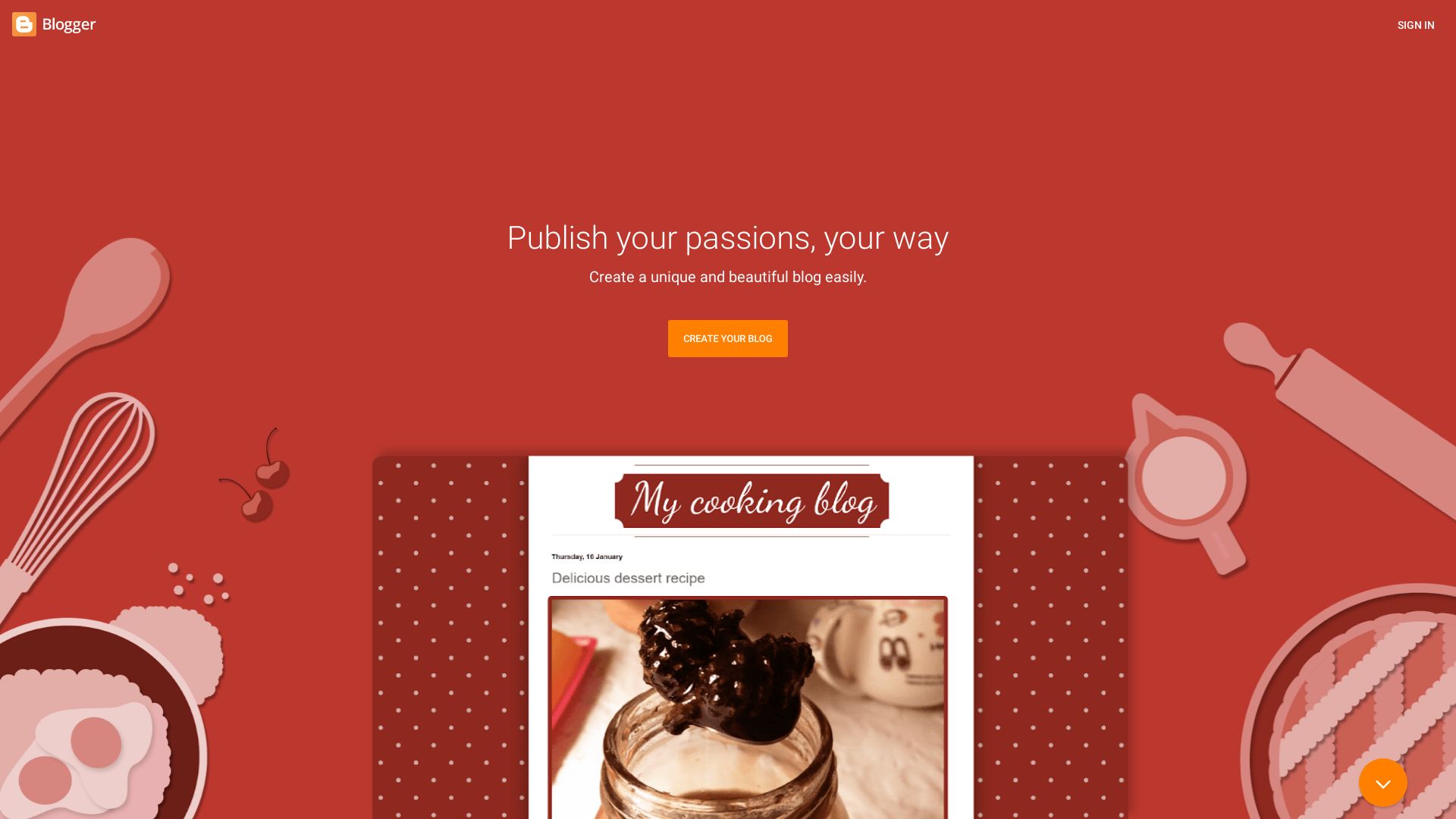
Blogger, an ecommerce platform, is on a mission to turn pixels into profound experiences. With user experience etched into every facet of its design, Blogger ensures not just online visibility, but heart-throbbing customer retention.
Blogger’s Best Features
- Customer-centric design: Offers seamless and easy use.
- Effective navigation tools: Guides customers smoothly on homepage.
- Dynamic, responsive design: Provides seamless display across devices.
- Data-driven product recommendations: Personalizes customer experience.
| Extra Features | Benefits |
|---|---|
| Secure check-outs | Enhances customer confidence |
| Unified aesthetics and messaging | Aids in successful business branding |
| High-quality product and team photos | Boosts trust and relationship-building |
Blogger Downsides
- Requires professional photos for enhanced product trust.
- Lack of live chat may hinder instant customer assistance.
- Adherence to a unified aesthetic can potentially limit creative freedom.
Blogger Pricing
Although the specific pricing details for Blogger aren’t provided in the company summary, rest assured that it provides a value-rich experience at what can be expected to be a competitive rate.
Blogger Use Cases
Use Case 1: Ecommerce Businesses
Blogger, with its focus on user experience and retention, makes for an effective platform for ecommerce businesses looking to increase customer engagement and conversion rates.
Use Case 2: Brand Development
Companies striving to establish a robust online brand identity will find Blogger an excellent choice with its integrated aesthetics and design.
Use Case 3: Online Retailers
Online retailers juggling large inventories will appreciate Blogger’s data-driven product recommendations and efficient navigational tools for an optimized user experience.
Framer
Meet Framer, a sophisticated web design platform that’s transforming how non-coders create dynamic, responsive websites. Powered by the prowess of AI, Framer empowers creators with an intuitive drag-and-drop interface.
Framer Top Features
- SEO optimization: Boost your site’s visibility with built-in SEO.
- Site management: Stay in control of your website, from design to deployment.
- Figma plugin integration: Seamlessly transition designs from Figma to Framer.
- Collaborative space: Brainstorm, build, and bring beautiful websites to life with your team.
- Custom code integration: Tailor your website with extra personalization and functionality.
| 7-day version history: | Revert changes and track your progress. |
| Unlimited viewers: | Engage a limitless audience, at no extra cost. |
| Enhanced security: | Rest easy, knowing your data is safely stored and protected. |
Framer Downsides
- Despite its strengths, Framer’s CMS support falls short compared to competitors like Webflow and Bubble.
- It lacks native e-commerce features, a downside for online storeowners.
- The learning curve for new users could also be a challenge, but it is well-compensated by Framer’s powerful features.
Framer Pricing
Think Framer could be the web design revolution your brand needs? Jump in with the free plan or grab the Mini Plan for just $5/month. Craving more specs? Unleash the Full Power for $15/month or go Pro at $25/month. Plus, custom Business plans and team pricing are also available.
Framer Use Cases
Use case 1: Startups
Framer’s cost-effective and all-inclusive design capabilities make it a go-to solution for startups looking to make their mark online without stretching their tight budgets.
Use case 2: Freelancers
For freelancers, Framer’s ease of use, combined with powerful features like the Figma integration and custom code integration, facilitate the rapid delivery of compelling, high-quality websites for their clients.
Use case 3: Large Corporations
Large corporations will find value in Framer’s collaborative spaces and enhanced security, enabling collaborative and secure design efforts.
Elementor: Augmenting Digital Storytelling
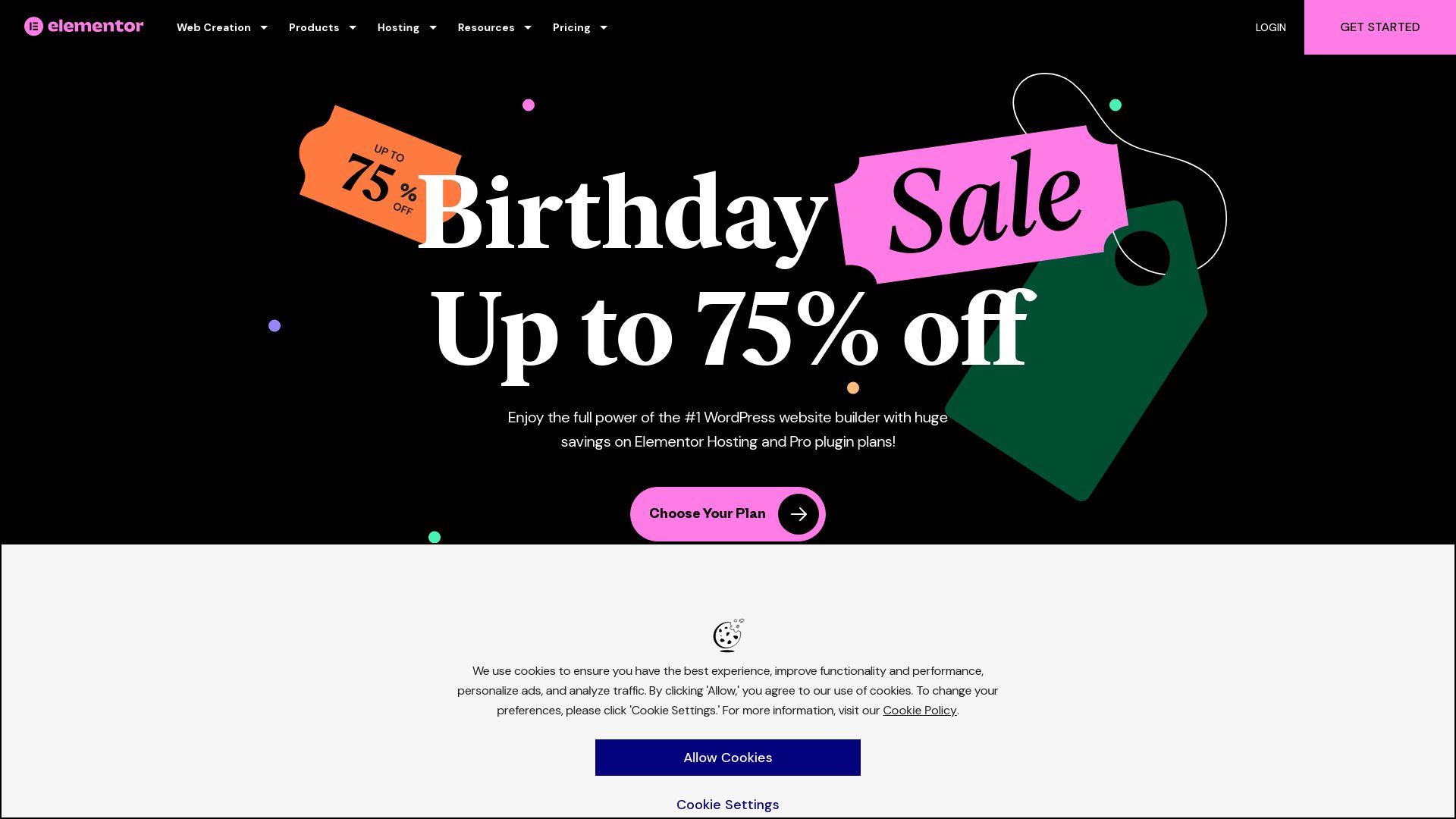
Delve into the world of Elementor, a visionary platform that leverages the power of augmented reality.
Elementor: Salient Features
- Functional Cookies: Enhancing user interactivity and personalization.
- Third-party services: Integrating diverse resources to amplify functionality.
- Targeting Cookies: Aligning with user preferences to promote relevant advertising.
- Strictly Necessary Cookies: Indispensable elements ensuring optimal website operation.
- Performance Cookies: Empowering analytical insights on website visits and traffic sources.
| Features | Benefits |
|---|---|
| Functional Cookies | Personalized User Experience |
| Third-party Services | Enhanced Functionality |
| Performance Cookies | Improved Analytical Insights |
Elementor Limitations<
- Dependent on user data: The functionality and personalization heavily rely on user consent on cookies.
- Ad-reliance: The targeted advertising system could potentially interrupt user experience with excessive promotions.
Elementor Pricing
In order to discover Elementor’s pricing details aligning with your specific needs, please refer directly to their official webpage.
Elementor Use Cases
Use Case 1
Elementor significantly enhances the browsing experience for daily web users with its functional cookies.
Use Case 2
For digital marketers, Elementor’s targeted cookies enable a data-driven advertising approach boosting campaign effectiveness.
Use Case 3
Analytics professionals can leverage the platform’s performance cookies to drive strategic decisions based on traffic sources and user behaviors.
Unveiling the Giant: WordPress
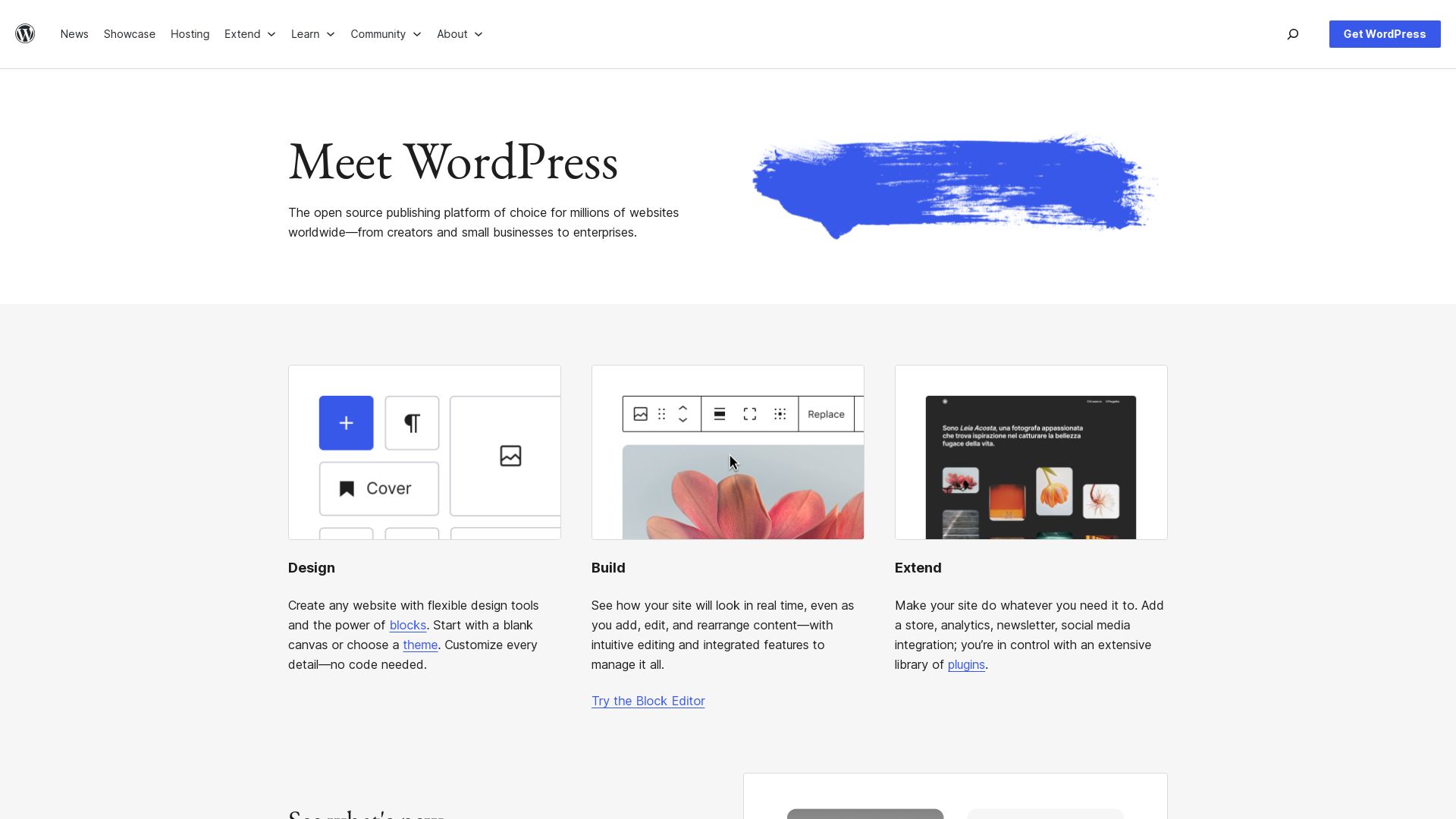
Dominate the digital landscape with the CMS juggernaut WordPress. Powering 40% of global websites and housing 64% of the CMS market share, WordPress is anything but ordinary.
Best-in-Class Features of WordPress
- Global Dominance: With a staggering 70% of websites riding the WordPress wave, its popularity is unparalleled.
- WooCommerce: Your eCommerce requirements get a significant upgrade. With over 5 million live websites using WooCommerce, it’s evident WordPress knows the eCommerce ballgame inside-out.
- Robust Customization: Over 1,200 eCommerce-centric WordPress themes await your creative touch. Take your online store from ‘meh’ to ‘magnificent’.
- Top-Tier SEO Capabilities: Stay Google’s darling with the Yoast SEO plugin, ushering your website into the SEO friendly zone.
| Feature | Impact |
| Domain Registration, SSL, and Essentials | Covering necessary features with little strain on the budget. |
| Extensive Plugin Range | From virtual product booking to upselling – WordPress plugins have something for every need. |
| Payment Extensions | Choose from WooCommerce Payments, Stripe, PayPal, Afterpay, and more for seamless transactions. |
The Downsides of WordPress
No platform is perfect, and WordPress is no exception. It brings along its bag of limitations.
- Overlap with eCommerce: WordPress might not be the go-to platform if eCommerce is your primary focus.
- Plugin Compatibility: Occasionally, WordPress plugins get into a scuffle, which might need your intervention.
Cracking Open the WordPress Pricing
Get the best that WordPress has on offer sans breaking the bank. Domain registration, SSL costs, and other essentials fall into the pocket-friendly range of $15-$50 monthly. Design customization could range from $1,000-$10,000 depending on the complexity, while added features like plugins and marketing services can add to the cost.
Find Your WordPress Fit
Case 1: You Need a Website STAT!
When quick setups are your priority, WordPress comes to the rescue. Benefit from quick domain setups, automated updates, and easy rollbacks.
Case 2: Meticulously Tailored Websites
For those who have a specific vision in mind, WordPress’s extensive customization options are a blessing. Go from cookie-cutter to standout with customization ranging from design to development.
Case 3: eCommerce Enthusiasts
If you’re diving head-first into the eCommerce pool, WordPress’s WooCommerce platform is the lifesaver you need. Create optimized storefronts, manage inventory efficiently, and get real-time shipping prices – all on one platform.
Wix
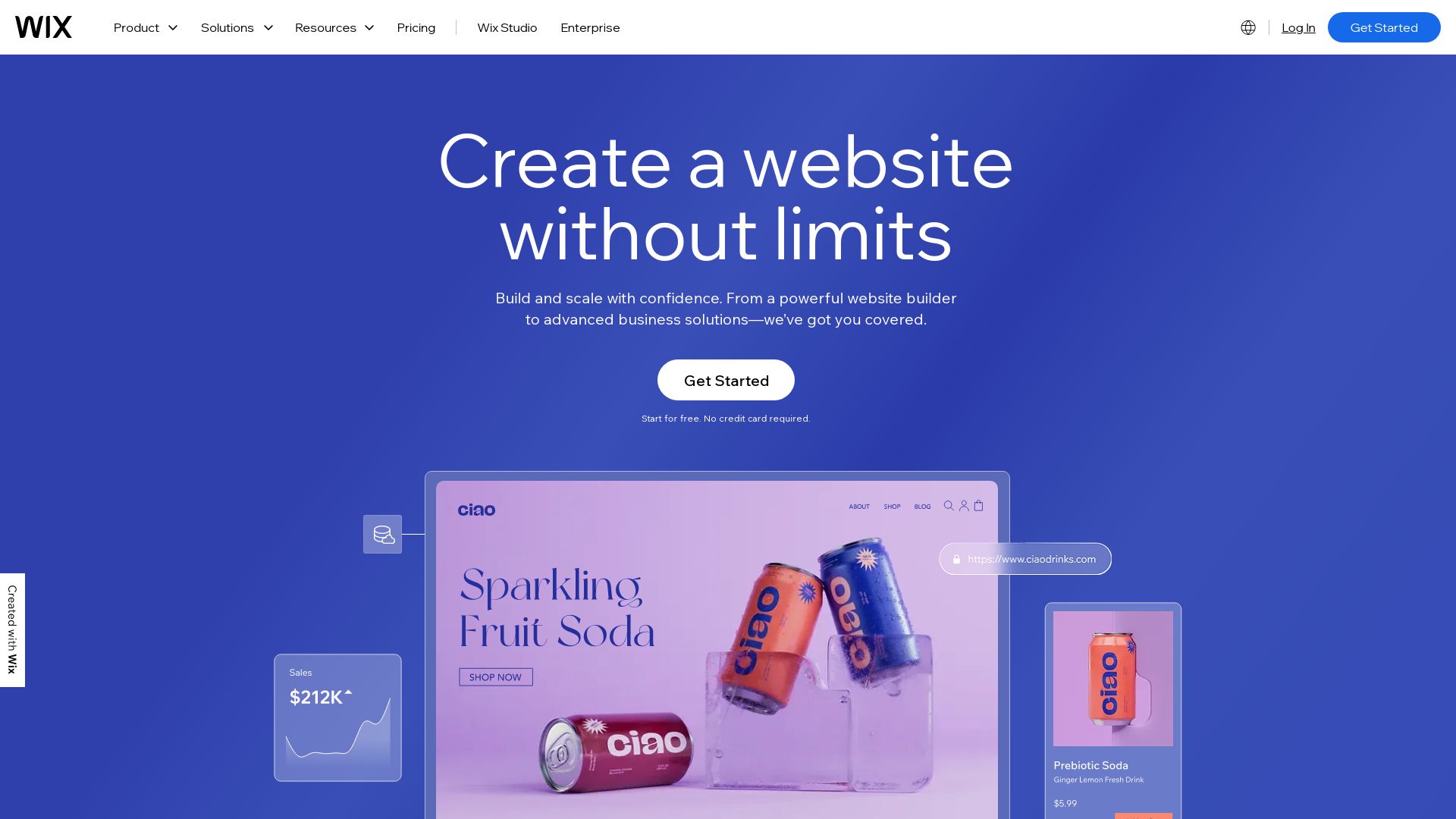
An adept contender in eCommerce platforms, Wix enhances user experience with its intuitive and robust capabilities. Catering to businesses across all stages, Wix ensures a seamless transition for brick-and-mortar businesses towards an online arena.
Wix Top Features
- High-Volume Sales Handling: Capable of accommodating up to 750 transactions per second.
- Extensive Payment Solutions: Supports 80+ payment gateways, including the bespoke Wix POS.
- Versatile Design: Over 500+ designer-made templates, all customizable for your unique brand.
- Powerful eCommerce Functions: Leverage the strength of Velo for superior eCommerce features.
| Feature | Description |
|---|---|
| Wix’s App Market | An array of third-party apps and integrations to expand the platform’s capabilities. |
| Scalability | Robust and flexible enough to accommodate your business growth. |
| SEO-friendly tools | Visibility magnifiers for superior search engine ranking positions in the SERPs. |
Wix Downsides
- Limited capability to switch templates once your website goes live.
- Free plan shows Wix ads and doesn’t have eCommerce functionalities.
Wix Pricing
Wix operates on a freemium business model. It offers free website building, with premium upgrades available for advanced features and functionalities. Pricing details can be found on the official Wix website.
Wix Use Cases
Use case 1: Startups
Startups can leverage Wix’s all-in-one platform to quickly and professionally set up their online presence, streamline sales, and manage operations effectively.
Use case 2: Brick-and-Mortar Businesses
Physical stores embarking on digital transformation can utilize Wix to smoothly transition online with comprehensive eCommerce functionalities.
Use case 3: Growing Businesses
Growing businesses benefit from Wix’s scalability, empowering them to expand their operations, enhance customer outreach, and improve sales figures.
Squarespace
Your answer to creating stimulating websites with an aesthetic flair is Squarespace. This website builder platform offers an impressive blend of sleek templates and commerce tools for an all-around appealing web presence.
Squarespace Top Features
- Appealing, customizable templates via Squarespace Blueprint
- Specialized platform for online stores: Squarespace Commerce
- Integrated scheduling for appointments, classes, etc.
- Powerful analytics for tracking visitor behavior and sales
- SEO-optimized and with ready integration for social media and email marketing
- E-commerce abilities with unlimited product management and multiple payment gateways
| Email Campaigns | Create and launch intensive campaigns |
| Membership Sites | Build gated communities within your website |
| Squarespace Extensions | Access useful applications tailored to improve your site |
Squarespace Limitations
- Restricted range of apps on Squarespace Extensions
- Shipping connected via third-party providers
- Limited customer support channels
Squarespace Use Cases
Use Case 1
Businesses seeking to start an online store will find Squarespace with its specialized commerce platform and abundant ecommerce tools, a top-tier choice.
Use Case 2
Artists and creatives can leverage Squarespace’s visually impactful templates to showcase their work in an appealing manner.
Use Case 3
Companies looking for intensive customer engagement will benefit from Squarespace’s inbuilt analytics and SEO optimization tools for driving customer interactions.
Bubble
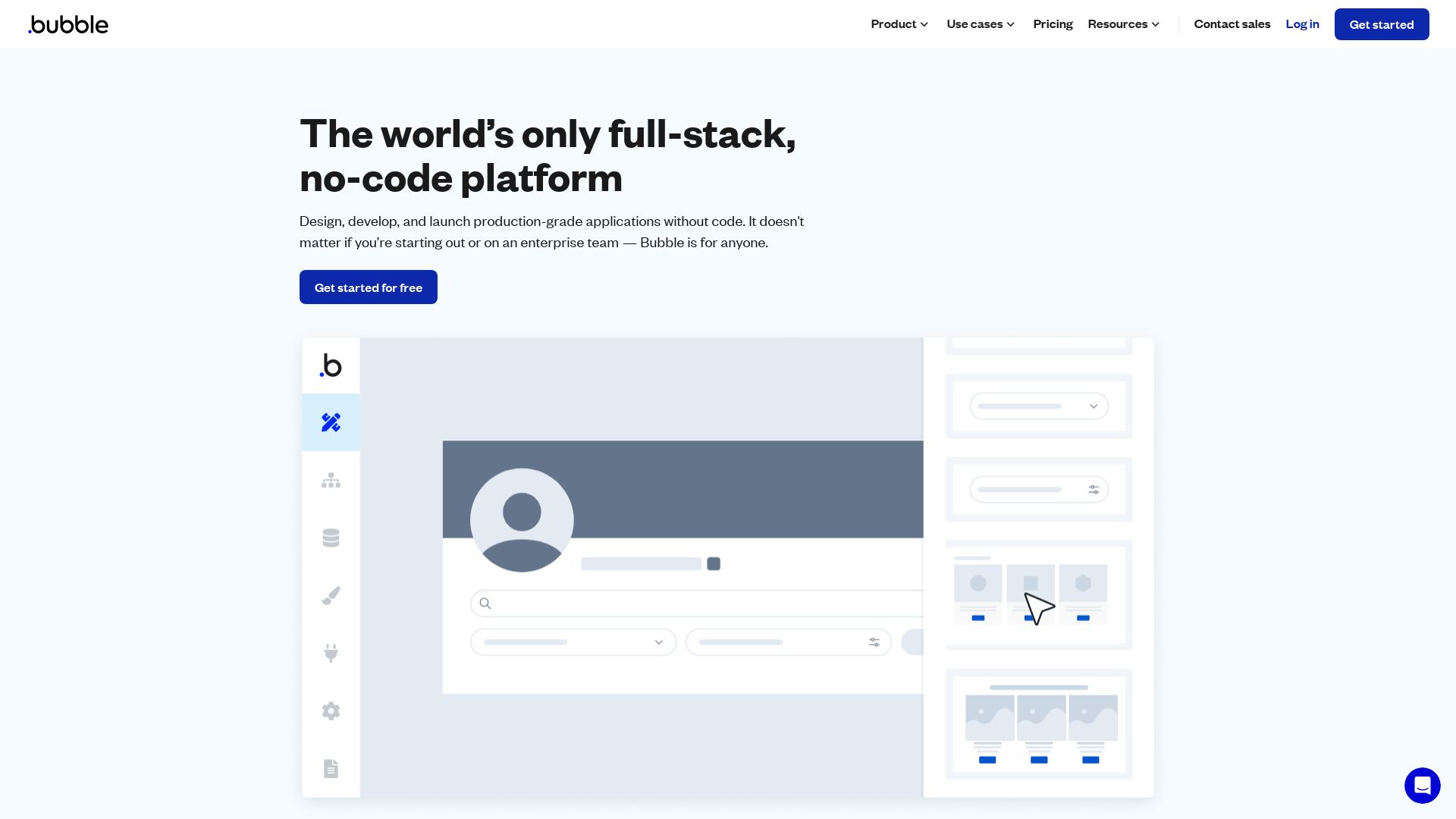
Welcome to the world of Bubble, a unique realm in the cloud that allows you to build web applications without having to code. This visual drag-and-drop builder caters to both novices and experienced professionals alike, offering intricate hosting and server management features.
Bubble: A Medley of Top Features
- Non-technical friendly: Suited for users with basics in computer science, capable of creating web applications without prior experience in coding or designing.
- Capability to customize: Tailor your Bubble app with HTML, CSS, and JavaScript for absolute application control.
- Versatile applications: Create a variety of platforms such as websites, landing pages, blogs, and e-commerce stores.
| Feature | Description |
|---|---|
| Integration | Seamlessly integrate with platforms like Airtable, Integromat, Weglot, Tidio, and Stripe for a wide range of projects. |
| Collaborative approach | Engage in solution-oriented forums and customer support for shared problem-solving. |
Bubble’s Unique Limitations
- Limited SEO-friendliness in comparison to peers like Webflow.
- Design freedom is restricted when compared with other platforms such as Weebly.
Bubble Pricing
Bubble offers four distinct pricing plans catering to varied needs, ensuring you find a plan that fits your requirements perfectly.
Bubble Use Cases
Use Case 1: Manufacturing
Bubble’s drag-and-drop design and no-code use make it ideal for managing intricate processes in manufacturing.
Use Case 2: E-commerce
With seamless integration capabilities, it offers a robust platform for e-commerce, online sales, and order management.
Use Case 3: Small Business Owners
Its subscription-based model with four different plans suits the funding and platform needs of various small businesses.
Editor X
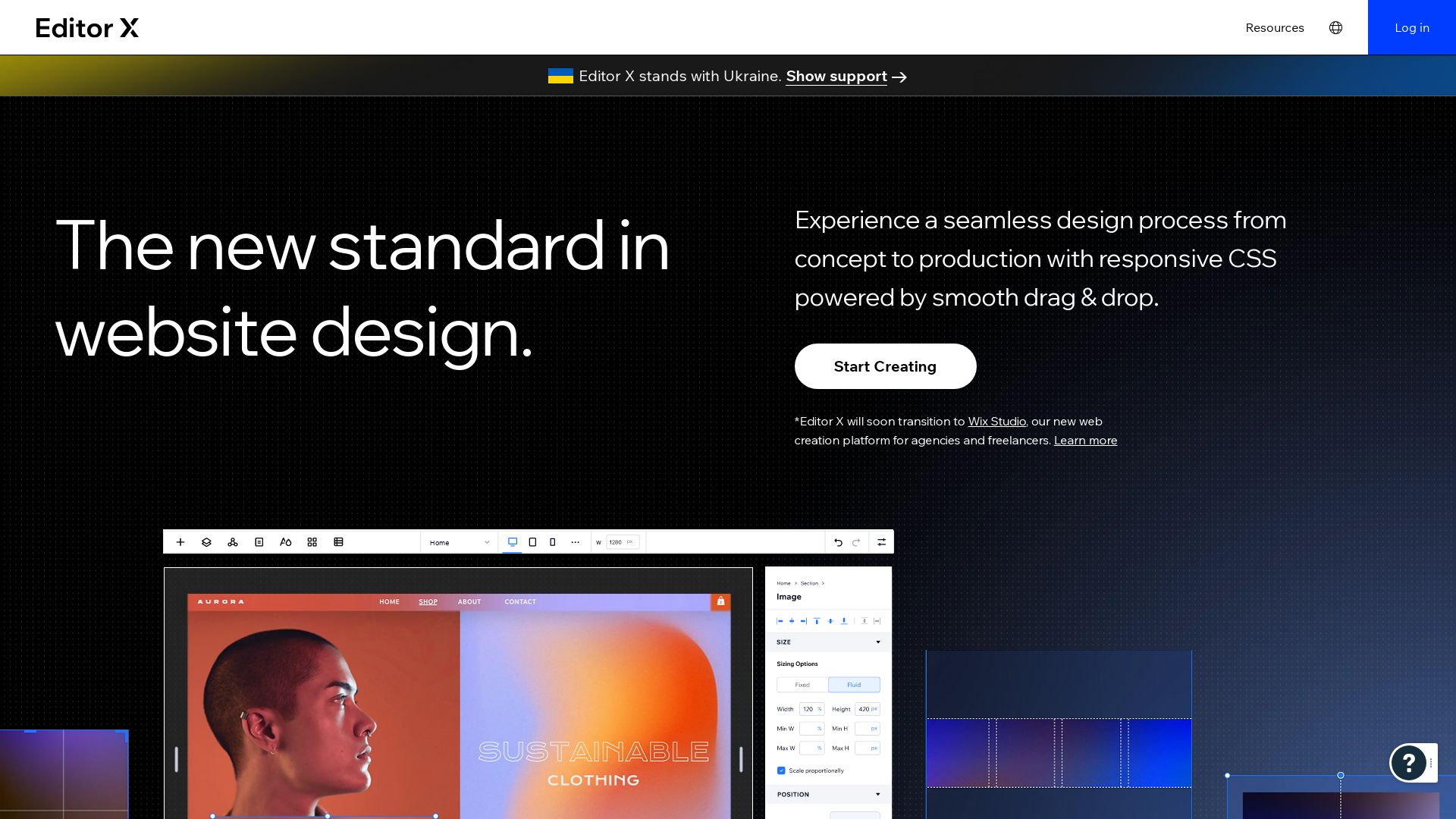
Introducing Editor X, an advanced creation platform brought to you by Wix in 2020. With a Trustpilot rating of 4.6/5, it serves as a remarkable tool for web professionals and designers, greatly leveraged by entrepreneurs to enhance their online presence.
Editor X Top Features
- Customisable website with responsive design
- Drag-and-drop tool and exquisite design templates
- Unique collaboration feature allowing simultaneous work by teams
- Powerful coding and debugging options; compatibility with multiple languages
- Ecommerce solutions; integrated payment processing and online store creation
| Feature | Description |
|---|---|
| Business solutions | Offers options for invoicing, lead generation, secure web hosting, and insightful analytics reports |
| UGC collection feature | Effective collection of testimonials, feedback, leads, and data maintaining user interaction |
| Latest Update for Restaurants | Advanced functionality including online reservations tool, options to sell subscriptions, memberships, packages |
Editor X Downsides
- Transitioning to Wix Studio might require getting used to new user interfaces
- Complex features demand a steep learning curve
Editor X Use Cases
Use case 1
In the realm of Ecommerce, Editor X stands out with integrated payment processing, diverse shopping cart options, and tools for online store creation. Ideal for businesses looking to step into the online marketplace.
Use case 2
Online marketing is taken to the next level with connectivity to marketing tools such as Google Analytics, Facebook Pixel, and HotJar. Automated postings, video maker for promo videos, and email campaign maker complement this feature suite.
Use case 3
In the sphere of Collaboration, Editor X offers unique features allowing teams to simultaneously work on projects, defining precise user permissions for effective team collaboration.
Shopify
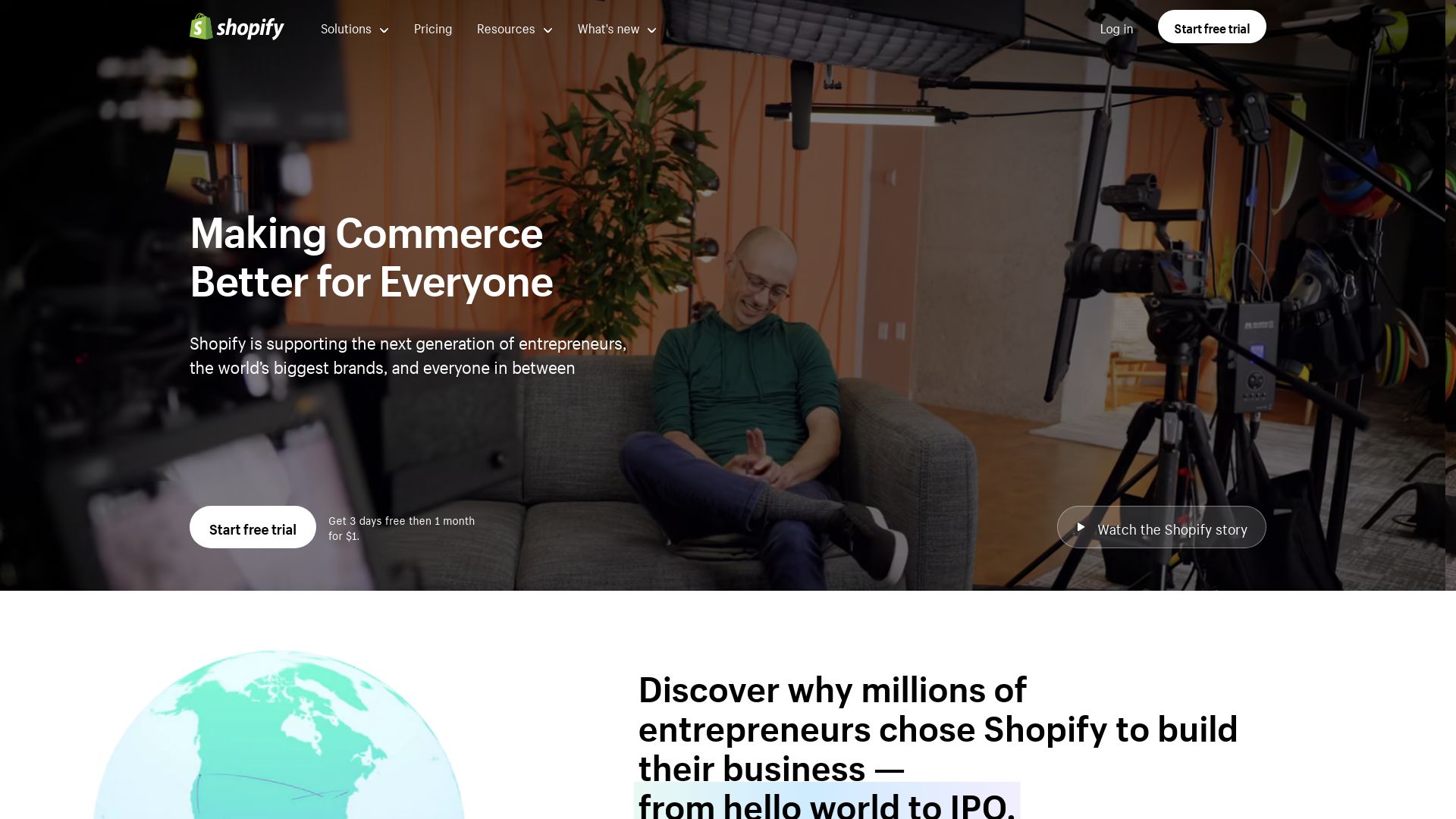
The globally acclaimed eCommerce platform, Shopify, offers a vast range of pre-made templates to devise and curate websites. However, to attain a unique and brand-specific aesthetic, custom design might be required.
Shopify Top Features
- Pre-made and affordable templates
- Options for custom website design through third-parties or professional agencies
- Potential for full Shopify store design
- Individual page designs, custom functionality, and integration with custom ERP or CRM systems
- SEO aiding in nearly 43% of eCommerce sales
- Native or headless builds possible
| Feature | Benefit |
|---|---|
| Search Functionality | Enhances user retention and engagement |
| Promotion and Discount Tools | Triggers conversions |
| Carousel Slides, Mega Menus, Newsletter Sign-ups | Boosts user interaction and data collection |
Shopify Limitations
- Inherent need for separate page designs for distinct page templates
- No provision for custom design services by Shopify itself
- Potential additional costs for extensive projects
Shopify Pricing
Financial footprint covers monthly Shopify subscription ($29.99-$299.99), cost of themes/templates, expense for custom Shopify website design, and additional functionality development costs.
Shopify Use Cases
Use case 1
Entrepreneurs launching eCommerce stores can take advantage of Shopify’s pre-made templates to save time and resources on website design.
Use case 2
Established brands seeking a unique aesthetic will find value in Shopify’s custom design options, offering a brand-tailored look and feel.
Use case 3
Digitally-focused brands can leverage Shopify’s SEO-focus to drive traffic and boost eCommerce sales from search engines.
Hannah Stewart
Content writer @ Aircada, tech enthusiast, metaverse explorer, and coffee addict. Weaving stories in digital realms.



